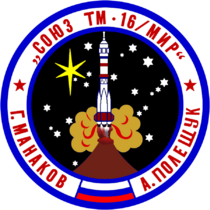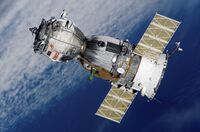Engineering:Soyuz TM-16
| Operator | Rosaviakosmos |
|---|---|
| COSPAR ID | 1993-005A |
| Mission duration | 179 days, 43 minutes, 45 seconds |
| Orbits completed | ~2,790 |
| Spacecraft properties | |
| Spacecraft | Soyuz 7K-STM No. 101 |
| Spacecraft type | Soyuz-TM |
| Manufacturer | NPO Energia |
| Launch mass | 7,150 kilograms (15,760 lb) |
| Crew | |
| Crew size | 2 up 3 down |
| Members | Gennadi Manakov Alexander Poleshchuk |
| Landing | Jean-Pierre Haigneré |
| Callsign | Вулка́н (Vulkan - Volcano) |
| Start of mission | |
| Launch date | 24 January 1993, 05:58:05 UTC |
| Rocket | Soyuz-U2 |
| End of mission | |
| Landing date | 22 July 1993, 06:41:50 UTC |
| Landing site | 140 kilometres (87 mi) S of Dzhezkazgan |
| Orbital parameters | |
| Reference system | Geocentric |
| Regime | Low Earth |
| Perigee altitude | 393 kilometres (244 mi) |
| Apogee altitude | 394 kilometres (245 mi) |
| Inclination | 51.6 degrees |
| Docking with Mir | |
| Docking date | 26 January 1993, 07:31:17 UTC |
| Undocking date | 22 July 1993, 3:00:30 UTC |

Soyuz programme (Crewed missions) | |
Soyuz TM-16 was the sixteenth expedition to the Russian Space Station Mir.[1]
The Soyuz-TM crew transports (T - транспортный - Transportnyi - meaning transport, M - модифицированный - Modifitsirovannyi- meaning modified) were fourth generation (1986–2002) Soyuz spacecraft used for ferry flights to the Mir and ISS space stations. It added to the Soyuz-T new docking and rendezvous, radio communications, emergency and integrated parachute/landing engine systems. The new Kurs rendezvous and docking system permitted the Soyuz-TM to maneuver independently of the station, without the station making "mirror image" maneuvers to match unwanted translations introduced by earlier models' aft-mounted attitude control.
Crew
| Position | Launching crew | Landing crew |
|---|---|---|
| Commander | Second spaceflight | |
| Flight Engineer | First spaceflight | |
| Research Cosmonaut | None | First spaceflight |
Mission highlights


16th expedition to Mir.
First Soyuz without a probe and drogue docking system since 1976. It carried an APAS-89 androgynous docking unit different from the APAS-75 unit used for ASTP in 1975, yet similar in general principles. Soyuz-TM 16 used it to dock with an androgynous docking port on the Kristall module. This was a test of the docking system in preparation for dockings by the Space Shuttles with Mir.
References
- ↑ The mission report is available here:http://www.spacefacts.de/mission/english/soyuz-tm16.htm



